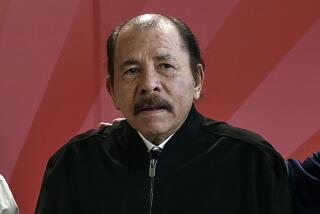A Constitution Bows to Repression : Nicaragua’s Sandinistas Codify Party’s Absolute Power
- Share via
For 3 hours and 45 minutes on Jan. 9 the Nicaraguan people were legally entitled to the rights that we take for granted. Despite harassment and the threat of persecution, they took advantage of the opportunity to demonstrate against the communist Sandinista regime. Thousands chanted and carried placards demanding “Democracy yes, communism no” and “We want food, we do not want weapons.” The occasion was the signing of Nicaragua’s new constitution.
Presented as proof of their democratic credentials, the Sandinistas’ constitution is really nothing more than a legal facade with which the Soviet-backed regime can try to mask its totalitarian rule. The constitution codifies the Sandinista party’s absolute power. As with similar provisions in the Soviet and Cuban constitutions, the Sandinista charter proclaims that the “state is the fundamental instrument of the people.” And, like their Soviet and Cuban patrons, the Sandinistas are the “vanguard of the people”--meaning that only they can interpret the will of the people. The new constitution is thus a legal brief for repression, not a guarantee of legal rights.
In domestic policy the constitution makes the state, meaning the party, all powerful. It codifies state direction of the economy; it codifies the ration-card system, by which food distribution is utilized as a political tool to control the people; it codifies the power of the state to “protect” the family and to “plan, direct and organize” the education system, a clear attack on the historic practice of churches to maintain schools of their own, and it codifies existing agrarian-reform laws, which have been used to harass and punish Sandinista opponents.
Given the firm Sandinista grip over the executive branch, and the total absence of any checks and balances by the other branches of government, the nine comandantes who rule Nicaragua have a new, potentially potent weapon with which to suppress the opposition further and cling to power. While the constitution establishes four branches of government with distinct powers and responsibilities, in reality three of them--the legislative, judicial and electoral branches--are closely controlled by one, the executive. The president is given broad and sweeping powers that ensure Sandinista domination. His authority is virtually absolute in matters regarding the military, national security, the economy, education and foreign and domestic commerce.
With the constitution sanctioning the merger of state and party, the road is now clear for continued domination of all aspects of life in Nicaragua by the Sandinista comandantes. And if there is ever any dispute about who is in control of the country, the communist rulers can readily call on the Sandinista police or armed forces, now officially designated the Sandinista Popular Army.
Although many provisions of the new constitution appear to guarantee individual rights, Sandinista behavior would indicate that those provisions would be manipulated, suspended or simply ignored if they were seen as impediments to Sandinista consolidation. The key factor is the use that those in power make of the constitution. The civil rights of those who oppose Sandinista policies have not been respected. There is no reason to think that they will be in the future.
As opposition leaders asserted in a statement issued on the day of the signing of the document, “Today, the Sandinista Front will stage another farce by promulgating the so-called constitution, which will only be for export. It will be a decorated text, a dead letter, because ever since Sandinismo reached power, it has violated its own laws.”
The Sandinistas’ record speaks for itself. They have repressed opposition political and labor groups, the church and the press. The constitution codifies this repressive apparatus. For these reasons a quarter of a million Nicaraguans have fled their own country and thousands have taken up arms to reclaim the rights and freedoms that we Americans take for granted.
Within hours of the promulgation of the new supreme law of the land, President Daniel Ortega decreed a state of emergency, once again suspending the civil liberties of the people of Nicaragua--including the right to equal protection of law, to privacy, conscience, thought, speech, travel and residence, the right to strike, to organize. With the stroke of a pen the due-process pledges provided elsewhere in the constitution were rendered null and void.
Protest placards that were to have been used on Jan. 9 in demonstrations against the constitution were confiscated by security officials of the Sandinista Interior Ministry. One opposition leader declared, “We cannot understand how they plan to promulgate a constitution which claims to guarantee the citizens rights and liberties if they have begun this day, which they label historic, by repressing the people.”
More to Read
Sign up for Essential California
The most important California stories and recommendations in your inbox every morning.
You may occasionally receive promotional content from the Los Angeles Times.












